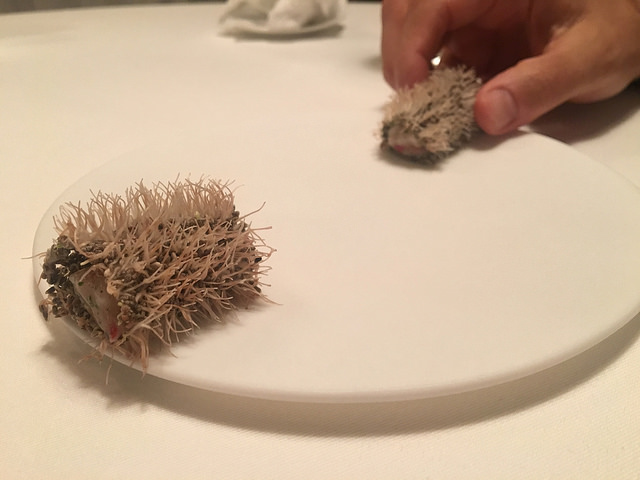Why was famed Spanish restaurant Mugaritz popping up in Cambridge?
Dinner at Mugaritz, Spain
When hosting a team of chefs from one of Spain’s top-ranked kitchens at your humble Cambridge restaurant, sometimes you need to expand your vocabulary.
That’s what Loyal Nine chef Marc Sheehan learned when Mugaritz executive chef Andoni Luis Aduriz and crew — eight in all — began working with him to plan a benefit dinner for Tufts University’s Jean Mayer Human Nutrition Research Center on Aging. It took place Sunday night and was the first time Mugaritz has done a pop-up in the United States.
Mugaritz has two Michelin stars and is currently No. 7 on the World’s 50 Best Restaurants list. A meal there might consist of two dozen dishes, with names like “toasted soup of oxidized wine” and “bitter ideas of velvet.” So preparing Loyal Nine for the event had its complexities.
Aduriz e-mailed Sheehan the menu and photos; then they discussed methods, amounts, and the not-so-simple recipes. After a few final Skype calls, Sheehan combed through his notes to see what still had to be sorted out.
There was a need for edible paper; Sheehan found it on a Japanese website. Then he had to figure out what a “gastronorm” was. “Eventually I looked it up online and found out it was just a hotel pan,” says Sheehan. Arguably the hardest challenge, but also maybe the most fun, was sourcing potatoes. It took him a month: Aduriz wanted la ratte potatoes — a small variety with a nutty flavor and a smooth, silky texture. He wanted them round, weighing around 25 grams each. At the farmers’ market, “we brought a scale around with us and went around weighing potatoes,” Sheehan says.
So what does Mugaritz have to do with research into healthy aging and nutrition? Aduriz is a member of the Tufts Nutrition Council — a group, launched this spring, of 50 thought leaders working together to identify and address some of the world’s biggest health risks. The benefit allowed him to do something tangible for the council.
“We are delighted to think that our effort, among others, may open paths that many can follow,” Aduriz says. “Beyond fund-raising, we hope to start a dialogue between those who hold the knowledge and those who may help share it with society.”
In “Off-Road,” a 2015 documentary about the people and elements that form the Mugaritz experience, Aduriz speaks of food as an art form made up of ingredients and concepts. It is an experience that he hopes will reward guests intellectually and gastronomically. But there is more to it than that, he says.
“Cuisine and gastronomy are stagnant activities,” says the Spanish chef. “On the other hand, they are also terrains with an underlying layer in culture, emotion, identity, society, environment, economy, philosophy, and health. Nutrition is a fundamental pillar in all this.”
The World Health Organization estimates that $51.3 billion a year is spent globally on disease-associated malnutrition in older adults. Half of all older adults are at risk for malnutrition. “Poor nutrition is the number one factor of poor health, and the number one in preventable health costs,” says Dariush Mozaffarian, dean of the Tufts Friedman School of Nutrition Science and Policy. “It’s a huge burden on our economy and a huge issue for the environment.”
Then, too, food is about more than nutrition, says Simin Meydani, the vice provost for research at Tufts. “It provides benefits in other ways,” she says. “It’s the atmosphere and the socialization that comes with consuming food that is put together creatively and that is consumed with others.” The Mugaritz dinner at Loyal Nine summed this all up. “It was a very creative way to bring attention to this topic,” she says.
And so the menu came together, encompassing the likes of “edible stones,” walnut omelets, a gelatinous chicken mille-feuille, egg yolks tucked in with a sea urchin blanket. There was something called “My guts are growling,” a course dubbed “A thousand leaves. . .,” and “lemon succade with our herbs from yesterday and today.” There was poetry and creativity, and fortification for the work ahead. The next project for the nutrition council: drafting a letter to the White House transition team about planning for a healthy future.
After months of planning, the chef from Loyal Nine could finally relax. “It was interesting to watch them work so efficiently,” says Sheehan of the Mugaritz team. “They not only knew the food so well, but they knew each other so well and could communicate nonverbally.”
At the end of the night, every guest seemed to leave with a personal invitation to come to Spain. When they were gone, someone ordered pizzas.
“It was great to have Andoni behind my bar eating pizza at 2 a.m.,” says Sheehan.
Written and published for the Boston Globe.
.

